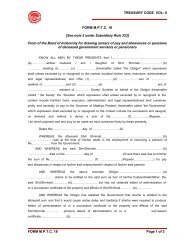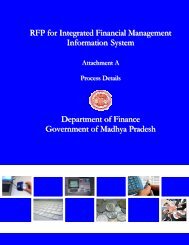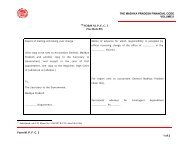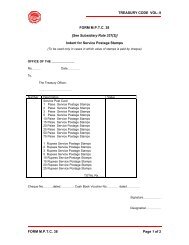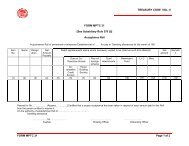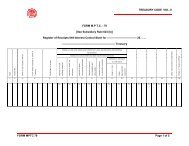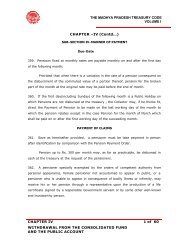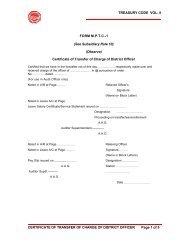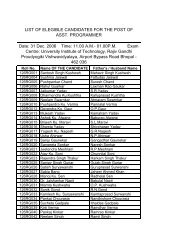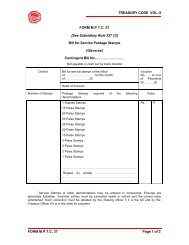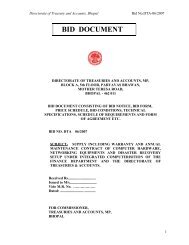THE MADHYA PRADESH TREASURY CODE ... - Mptreasury.org
THE MADHYA PRADESH TREASURY CODE ... - Mptreasury.org
THE MADHYA PRADESH TREASURY CODE ... - Mptreasury.org
Create successful ePaper yourself
Turn your PDF publications into a flip-book with our unique Google optimized e-Paper software.
<strong>THE</strong> <strong>MADHYA</strong> <strong>PRADESH</strong> <strong>TREASURY</strong> <strong>CODE</strong>VOLUME ICHAPTER - IIRECEIPT OF GOVERNMENT MONEYS AND PAYMENT OF SUCH MONEYSINTO <strong>THE</strong> CONSOLIDATED FUND AND PUBLIC ACCOUNT OF <strong>THE</strong>STATE.SECTION-I- GENERAL RULESGeneral Instructions for Handing Cash52. A person may tender moneys in payment of dues to Government either (a) tothe concerned departmental Officer by cheque, Bank Draft or in cash up to anamount not exceeding Rs. 300 in each case, or such higher amount as they may beauthorised to receive, or(b) at Treasury or the Bank.53. Save as otherwise expressly provided in these rules or in any authoriseddepartmental regulations, the following rules shall be observed by all Governmentservants who are required to receive and handle cash:-(i) Every Government servant receiving money on behalf of theGovernment should maintain a cash book in Form M. P. T. C. 5.(ii)All monetary transactions should be entered in the cash book as soonas they occur and attested by the officer-in-charge of the cash book intoken of check. Where the details of cash transactions are alsorecorded in separate revenue registers, the entries in such registersshould be tallied with the entries in the cash book by a responsibleofficial who should record a certificate to this effect in the relevantrevenue registers.(iii)The cash book should be closed at regular intervals if not daily andcompletely checked. The officer-in-charge of the cash book shouldverify the totaling of the cash book or have this done by someresponsible subordinate other than writer of the cash book, and initialit as correct.CHAPTER II 1 of 24RECEIPT OF GOVERNMENT MONEYS AND PAYMENT
<strong>THE</strong> <strong>MADHYA</strong> <strong>PRADESH</strong> <strong>TREASURY</strong> <strong>CODE</strong>VOLUME I(iv)At the end of each month the officer-in-charge of the cash book shouldpersonally verify the cash balance in the cash book and record asigned and dated certificate to that effect. An analysis of the cashbalance showing(a) the details of the balance under reach class viz.Temporary advance, pay, Travelling allowance, Contingencies,Miscellaneous, Revenue Receipts etc. , (b) the date from whichoutstanding, (c) the names of the payees, (d) the amounts to be paidto them, and (e) the reason for non-disbursement or non-paymentinto the treasury, etc. , should also be prepared at the same time andits clearance should be reviewed by the officer-in-charge of the cashbook once a month. The temporary advance must be adjusted asquickly as possible and in no case should the adjustment the delayedbeyond three months.(v)When Government money in the custody of a Government servant arepaid into the treasury or the Bank, the head of the office, making suchpayments, should compare the Treasury Officer's or the Bank's receipton the chalan or his pass book with the entry in the cash book beforeattesting it, and satisfy himself that the amounts have been actuallycredited into the treasury or the Bank. When the number of paymentsmade in a month is more than ten and total amount involved thereinexceeds Rs. 1, 000/-, he should, as soon as possible after the end ofthe month obtain from the treasury a consolidated receipt for allremittances made during the month, which should be compared withthe posting in the cash book.Note:1- Notwithstanding the provisions of this clause, the head of office may at hisdescription obtain a consolidated treasury receipt irrespective of the numberof payments made in a month and the total amount involved therein.Note:2- The consolidated treasury receipts should be sent to the Head of theoffice(or a Gazetted Officer nominated by him) by name and he should watchfor the same. The heads of the office should arrange to ensure that suchletters are really opened by himself or the officer nominated by him.CHAPTER II 2 of 24RECEIPT OF GOVERNMENT MONEYS AND PAYMENT
<strong>THE</strong> <strong>MADHYA</strong> <strong>PRADESH</strong> <strong>TREASURY</strong> <strong>CODE</strong>VOLUME I(c)When the amount to be handled exceeds Rs. 10, 000 the Nazir, or theAccountant, or the Cashier, as the case may be, should go toBank/Treasury/Post Office, etc. , accompanied by a police escort, aslaid down in Home (police) Deptt. Notification No. 190-4703-II-B(3),dated 16-1-1974.Note:2- The duties imposed by clauses(ii)to (vi) of this rule on the head of the officemay be entrusted to a subordinate gazetted officer nominated by the head ofthe office for the purpose.Note:3- The cash book should be bound in convenient volumes and their pagesmachine-numbered. Before bringing a cash book into use, the head of theoffice or the officer nominated by him in this behalf should count the numberof pages and record a certificate of count on the first page of the cash book.Note:4- Whenever any payment, not final in nature, is made out of cash balance orwhen an advance from permanent Advance is paid to any official for meetingemergent expenditure subject to his rendering account thereof supported byvouchers, the fact of payment of advance should be noted in red ink, in theparticulars' column on the payment side of the cash-book of the disbursingOfficer without entering the amount in the "amounts' column. The amount soadvanced will still form part of the cash-book balance of the disbursing officermaking the advance.Note:5- When payment of a bill is required to be made through some other person oragency in terms of SR 121(ix) or when payment is desired to be made bymeans of demand draft, cash order, etc. , or when the cash drawn from theTreasury is advanced to a subordinate officer for disbursement, it would benecessary for the drawing officer to make a note to this effect in the billregister M. P. T. C. 17 as it will be his responsibility to obtain detailed accounttogether with proper acknowledgements of the payee duly attested by thedisbursing officer and keep them safely in record in chronological order.Receipt of Coin, Notes, etc.CHAPTER II 4 of 24RECEIPT OF GOVERNMENT MONEYS AND PAYMENT
<strong>THE</strong> <strong>MADHYA</strong> <strong>PRADESH</strong> <strong>TREASURY</strong> <strong>CODE</strong>VOLUME I54. Government dues or other money receivable on Government account mayordinarily be realised in legal tender, coin or notes only. The conditions of legaltender and the currency of the various denominations of coin and notes are governedby the instructions embodied in part II, Chapter XII.Exception:- The Superintendent, Government printing, Madhya Pradesh isauthorised to accept revenue stamps and at his discretion in exceptional cases alsopostage stamps up to annals eight only in payment of the cost of Madhya PradeshGovernment Publications.Cheques tendered in payment of Government dues55. (a) At places where the cash business of the treasury is conducted bythe Bank, cheques on local Banks, which have clearing accounts with the ReserveBank or the State Bank of India, may be accepted in payment of Government, if thecheques have been crossed by the drawer. Until, however, a cheque has beencleared, the Government cannot admit that payment has been received andconsequently final receipt shall not be granted when a cheque is tendered. A receiptfor the actual cheque only may be given in the first instance, but if a person makingpayment in this manner so desires, a formal payment receipt shall be sent to hisaddress after the cheque has been cleared. Collection charges of the Bank, if any,will be recovered by or under instructions of the Bank from the party presenting thecheque.The preliminary acknowledgement of the receipt of the cheque will be gives inthe form below:-"Received cheque No. . . . . . . . . . . . . . . . . . . . . . . . . . . . . . . . . . . . forRupees. . . . . . . . . . . . . . . drawn on. . . . . . . . . . . . . . . . . . . . . . . . . . . . onaccount of. . . . . . . . . . . . . . . . . . . . . . . . . . . . . . . . As per chalan No.Note:- The Reserve Bank and the State Bank of India reserve to themselves the rightto refuse to accept cheques collection of which, in their opinion, cannotreasonably be undertaken and which they would not accept on behalf of theirown constituents.CHAPTER II 5 of 24RECEIPT OF GOVERNMENT MONEYS AND PAYMENT
<strong>THE</strong> <strong>MADHYA</strong> <strong>PRADESH</strong> <strong>TREASURY</strong> <strong>CODE</strong>VOLUME I(b) In the event of a cheque being dishonoured by the Bank onpresentation, the fact shall be reported at once to the tendere with a demandfor payment in cash, but the Government cannot accept any liability for lossor damage which may possibly occur as a result of delay in intimating that thecheque has been dishonoured. The chalan pertaining to such dishonouredcheque should not be returned to the presenter of the cheque but it should bedestroyed.(c) When Government dues which are payable by certain fixed dates arepaid by cheque, the person desiring to make such payment in this mannerwithout risk must take suitable precautions to ensure that his cheque reachesthe treasury or the receiving office at the latest on the working day precedingthe date on which the payment is to be made. Cheques receive on the lastday of payment of Government dues may be refused at the discretion of theofficer to whom they are tendered and those received later will not beaccepted.56. Demand drafts shall not be distinguished from cheques for the purposes ofthese rules and, provided that a cheque tendered in payment of Government dues isaccepted under the provisions of S. R. 55 and is honoured on presentation, paymentshall be deemed to have been made--(i)if the cheque is handed over to the Government's banker or aGovernment Officer authorised to receive money on behalf of theGovernment, on the date on which it is so handed over; or(ii)if it is sent by post in pursuance of an instruction to make payment bypost, on the date on which the cover containing it is put into the post;Provided that where a cheque is marked as not payable before a certain date,the payment shall not be deemed to have been made until the date on which itbecomes payable.CHAPTER II 6 of 24RECEIPT OF GOVERNMENT MONEYS AND PAYMENT
<strong>THE</strong> <strong>MADHYA</strong> <strong>PRADESH</strong> <strong>TREASURY</strong> <strong>CODE</strong>VOLUME INote:- The provisions of clause(ii) above apply mutatis mutandis to payments madeto the Government by postal Money Order or by any other recognised modeof remitting money by post.57. Special for the acceptance from the public of cheques, Bank pay orders andBank credit chalans in some departments may be prescribed in their departmentalregulations.Grant of Receipt to the payer58 (1) The head of an office where money is received on behalf of theGovernment must give the payer a receipt duly signed by him after he has satisfiedhimself, before signing the receipt and initialling its counterfoil, that the amount hasbeen entered properly in the cash books. If the circumstances so justify, he may athis discretion authorise any other officer sub-ordinate to him, whether gazetted ornon-gazetted, to sign such receipts for him.Note:1- The public service Commission Office is exempted from issuing moneyreceipts for the crossed Indian Postal received it, vide Note 1 below S. R.80(a)Note:2- It is not necessary to issue a receipt a payer in cases where the field staff ofthe Directorate of Small Savings receive moneys on account of sale of savingboxes.(2) Where money is realised not in cash but by recovery from a paymentmade on a bill setting forth full particulars of the deduction, a receipt may begranted only if specially desired by the payer, the fact of the recovery havingbeen made by deduction from the bill being clearly recorded on the receipt.(3) All receipts must be written in figures and in words in the original andsuch other copies of chalan in Forms M. P. T. C. 7 or 8 prescribed inSubsidiary Rule 68, as are required to be given to the tenders of moneys, andsigned in full over the 'Cash received/Received payment Stamp'. Othercopies of the chalans may, however, be initialled against the amount alreadyindicated therein over the 'Cash received/Received payment Stamp'.CHAPTER II 7 of 24RECEIPT OF GOVERNMENT MONEYS AND PAYMENT
<strong>THE</strong> <strong>MADHYA</strong> <strong>PRADESH</strong> <strong>TREASURY</strong> <strong>CODE</strong>VOLUME IForm and Custody of Receipt Books59. Receipt books in machine-numbered Form M. P. T. C. 6 may be obtained fromthe Superintendent, Stationery and Text Books, M. P. Bhopal. Each book shouldbear a serial number and this number and this number should also be printed oneach page of the receipt form. This standard form shall be used by all Governmentservants receiving money on behalf of the Government unless any special form ofreceipt is prescribed by departmental regulation to suit the convenience of anyparticular department or office.60. The receipt books must be kept under lock and key in the personal custody ofthe officer authorised to sign the receipt on behalf of the Government, and a registershowing the receipt and issue of these books should also be maintained.61. Before a receipt book is brought into use, the number of forms containedtherein shall be counted and the result recorded in a conspicuous place in the bookover the signature of the Government officer-in-charge of the book Counterfoils ofused receipt books shall be kept in his personal custody.Issue of Duplicates of copies of Receipts62. No Government servant may issue duplicates or copies of receipts granted formoney received on the allegation that the originals have been lost. If any necessityarises for such a document, a certificate may be given that on a specified day acertain sum on a certain account was received from a certain person. Thisprohibition only to the issue of duplicates on the allegation that the originals havebeen lost, and does not apply to cases authorised by these rules or by special ordersof the Government in which duplicates have to be prepared and tendered withoriginals.Note:- Rules for verification of a credit in the Treasury and issue of consequentcertificate of credit or non-credit by the treasury are given in Appendix 7-B.(These rules will have effect from 1 -9 -1969).Departmental RegulationsCHAPTER II 8 of 24RECEIPT OF GOVERNMENT MONEYS AND PAYMENT
<strong>THE</strong> <strong>MADHYA</strong> <strong>PRADESH</strong> <strong>TREASURY</strong> <strong>CODE</strong>VOLUME I63. Subject as provided in this section, the detailed procedure to be adoptedin any particular department of the Government with regard to realisation ofGovernment dues and granting of receipt for the money realised may be prescribedby departmental regulations.CHAPTER II 9 of 24RECEIPT OF GOVERNMENT MONEYS AND PAYMENT
<strong>THE</strong> <strong>MADHYA</strong> <strong>PRADESH</strong> <strong>TREASURY</strong> <strong>CODE</strong>VOLUME ISECTION II- PROCEDURE FOR PAYING MONEYS INTO <strong>THE</strong> CONSOLIDATEDFUND AND <strong>THE</strong> PUBLIC ACCOUNT OF <strong>THE</strong> STATE.Payment of Money64. Payment of money into the treasury or the Bank should ordinarily bemade only in cash, but cheques, Bank pay orders and Bank credit chalans acceptedunder the provisions of rules 55 and 57 and also the National Savings/planCertificate will be received for credit in the Consolidated Fund and the Public Accountof the State.Note:1- The conditions under which small coin and coin which is not legal tender,including foreign coins may be received at the treasury are regulated by theorders embodied in part II, Chapter XII.Note:2- All officers who are empowered to receive money on behalf of theGovernment, are authorised to accept the National Savings/plan certificates inpayment of Government dues in accordance with Rule L of the post officeNational Savings Certificate Rules 1944 and the Director General Post Offices,Circular No. 46, dated the 25th September, 1946 reproduced as Appendix 20.Besides the following further instructions should also be observed:-(1) The Certificates should be accepted only in payment of an amount duefrom the individual concerned.(2) The value for which a certificate is accepted in payment of Governmentdues will be its surrender value on the date of its presentation to thedepartmental officers.(3) The amount due to the Government should not be less than thesurrender value for which the certificate is accented and any excessamount due to the Government should be paid in cash. Consequently,no amount will be refundable in cash to any individual who tenders acertificate or certificates in payment of Government dues. In casesCHAPTER II 10 of 24RECEIPT OF GOVERNMENT MONEYS AND PAYMENT
<strong>THE</strong> <strong>MADHYA</strong> <strong>PRADESH</strong> <strong>TREASURY</strong> <strong>CODE</strong>VOLUME Iwhere further interest accrues on a certificate after it has beenaccepted from the holder and before encashment, the departmentalofficer concerned should see that the additional amount realised onencashment is credited to the Government as an item of miscellaneousrevenue.(4) The departmental officers who receive the National SavingsCertificates in payment of Government dues should see in particular:-(a)that the National Savings Certificates have completed theperiod on non-encashability prescribed in Rule G(1) of the postoffice National Savings Certificates Rules, 1944; and(b)that they have been duly discharged by the holders as laiddown in Rule L of the post office National Savings CertificatesRules and are accompanied by forms in NC (3) duly completedand signed by the holders.(5) The certificates and the N . C. 3 forms should be sent to the concernedtreasury or sub-treasury along with other remittances in cash. Thetreasury or sub-treasury officer will make a list of all the certificatesand the N. C. 3 forms received by him on any one day and send thislist together with the certificates and the N. C. 3 forms to the postoffice which has direct dealings with that treasury. The postmasterwill, after scrutinising the certificates and N. C. 3 forms sign the listand return it to the Treasury or sub-treasury On the strength of thesigned list, which will serve as a "Treasury Voucher" or on a treasuryvoucher received from the postmaster, the treasury or sub-treasuryofficer will credit the amount to this Government under the appropriatehead by debit to the postal Department.65. Whenever, under the provisions of sub-rule(2) of Treasury Rule 7. moneysreceived on Government account, instead of being paid into a treasury or the Bank,are utilised to meet departmental payments, the gross receipts and the paymentsmade there from shall be entered as receipts and expenditure in any record that mayCHAPTER II 11 of 24RECEIPT OF GOVERNMENT MONEYS AND PAYMENT
<strong>THE</strong> <strong>MADHYA</strong> <strong>PRADESH</strong> <strong>TREASURY</strong> <strong>CODE</strong>VOLUME Ibe kept of the payments into and withdrawals from the Consolidated Fund and thepublic Account of the State, and accounted for to the Accountant-General. If thereceipts are in excess of payments made, the excess shall be remitted to thetreasury or the Bank, as the case may be, and save where it is otherwise provided inthese rules, the Government servant making such remittance shall note on thememorandum or chalan presented under Rule 68, the full amount of cash actuallyreceived by him, and per contra, the expenses disbursed therefrom, and not merelythe net receipts.When a departmental officer remits a cheque to the treasury or the Bank inadjustment of departmental receipts temporarily appropriated for departmentalpayments, the particulars of the cheque shall be noted on the chalan or remittancenote.66. A Government servant remitting a cheque to the treasury or to the Bank fortransfer credit in the Consolidated Fund and the public Account of the State mustendorse the words "Received payment by transfer credit to * (sign of * to be madeat this place). . . . . . . . . . . . . . . . . . . . . . . . . . . . . . . . . . . . . . . . on thedocument. The Government servant who endorses a cheque in blank shall be heldprimarily responsible for the loss if anychance such a cheque is paid in cash.*The head of account to which the amount of cheque is creditable should beinserted here.67. Cash may not be received by Treasury Officers from officers of theGovernment for supplies of service postage stamps, such supplies being regulated bythe procedure laid down in Subsidiary Rule 337.MEMORANDUM OF CHALAN68. Subject as otherwise provided in these rules, or unless the Government inrelation to any particular class of transactions direct otherwise, any person payingmoney into a treasury or the Bank on Government account shall present with it amemorandum (or chalan), showing distinctly the nature of the payment the personCHAPTER II 12 of 24RECEIPT OF GOVERNMENT MONEYS AND PAYMENT
<strong>THE</strong> <strong>MADHYA</strong> <strong>PRADESH</strong> <strong>TREASURY</strong> <strong>CODE</strong>VOLUME Ior Government officer on whose account it is made, and all the informationnecessary for the preparation of the receipt to be given in exchange, for the properaccount classification of the credit and, where necessary, for its allocation betweenGovernments and departments concerned. As far as possible, separate chalans shallbe used for moneys creditable to different heads of accounts.Note:1- No chalan in required when under any special rule or order, revenuecollected at outlying stations is permitted to be remitted to treasuries bymeans of money order.Note:2- Any person paying money into a treasury or the Bank on Governmentaccount to the credit of the Central Public Works Department shall presentwith it a memorandum or chalan in form No. T. R. 6(in Central TreasuryRules Volume II) with the letters "C. P. W. D. " superimposed diagonally inred ink on the chalan.Forms to be used in paying money into the Treasury69. One of the following forms of bilingual chalans should be used in payingmoney into a treasury or sub-treasury:--(a) Chalans for money paid into the treasury (General) (Form M.P.T.C. 7).(b) Chalan on account of land revenue and cesses (Form M. P. T. C. 8)70. All chalans should bear the accounts classification.71. Printed forms of these chalans are supplied by the department/Officeconcerned and where no departmental office for which the revenue is credited islocated, by the treasury free of charge and should be presented induplicate/triplicate/quadruplicate as the case may be, in accordance with theprocedure prescribed above.72. Chalans are usually prepared in duplicate, but in the following cases single ortriplicate chalans should be presented:--(1) Single chalans---CHAPTER II 13 of 24RECEIPT OF GOVERNMENT MONEYS AND PAYMENT
<strong>THE</strong> <strong>MADHYA</strong> <strong>PRADESH</strong> <strong>TREASURY</strong> <strong>CODE</strong>VOLUME I(a)Money s ent to the treasury for purchase of service postage stamps.(b)money paid into the treasury for obtaining Reserve Bank drafts or cashorders;(c)remittances accompanied by a remittance pass-book--single chalan isrequired for the use of and will be retained by the treasury, while theTreasury Officer's acknowledgement in the remittance pass-book is thereceipt for the remitting officer; and(d)money sent to the treasury for purchase of court-fee stamps byDistrict and Sessions Judge's offices.Note:- The above instructions also apply in presenting chalans at a sub-treasury.(2) Triplicate calans----(a)Mutation fees paid under section 125(x) of Act XVIII (LandRevenue Act):(b)Court of Wards money paid into the treasury under the rules inthe Court of Wards Manual;(c)Money paid to the credit of district and dispensary funds;(d)Forest revenue when brought direct to the treasury.Chalan in respect of forest revenue exceeding Rs. 100 onaccount of forest contracts, when presented direct by forestcontractors, in triplicate, may be accepted by the treasury onlywhen they bear the seal of the Divisional Forest Officeconcerned, with date of issue therein and are free from anymutilation or correction;(e)Fees for filing documents under the Indian Companies Act1913, and other cognate acts, namely, the SocietiesRegistration Act, 1860, the Indian Life Assurance CompaniesCHAPTER II 14 of 24RECEIPT OF GOVERNMENT MONEYS AND PAYMENT
<strong>THE</strong> <strong>MADHYA</strong> <strong>PRADESH</strong> <strong>TREASURY</strong> <strong>CODE</strong>VOLUME IAct, 1912 and the provident Insurance Societies Act, 1912,and the Indian partnership Act, 1932;(f)Inspection fees under section 6(2) of the Central provincesBoiler Act, and examination fees under rule 35 of the rulesframed under that Act;(g)Sums paid to the credit of the major head "XIX-Stationery andPrinting" by heads of offices, except Collector. The TreasuryOfficer should send a copy of the challan to the Collector with aview to the inclusion of the receipts in the monthly return ofreceipts submitted by Collector to the State Government. In thecase of the sale of Entertainment Duty ticket books theTreasury Officer should, while forwarding copies of the triplicatechalans to the Collector, intimate by each denomination thenumber of ticket books sold to the cinema hoses;(h)Sums paid to the credit of the major head "XXII--Education bynon-Government agencies;(i)Recoveries from the co-operative Banks on account of the costof the Liquidation Establishment and valuation fees from LandMortgage Banks.(i)Payment of money into a treasury on account of the tax,penalty or composition under the Madhya Pradesh Finance Act,1938.(k) (i) The composition fees levied under--(a)the Central provinces and Berar Tobacco Act,(b)the Central provinces and Berar Sales of Motor Spiritand Lubricants Taxation Act, and(c)the Central Provinces Excise Act;CHAPTER II 15 of 24RECEIPT OF GOVERNMENT MONEYS AND PAYMENT
<strong>THE</strong> <strong>MADHYA</strong> <strong>PRADESH</strong> <strong>TREASURY</strong> <strong>CODE</strong>VOLUME I(ii)the penalties imposed under--(a) the Central provinces and Berar Tobacco Act, and(b) the Central Provinces and Berar Sales of Motor Spirit andLubricants Taxation Act, and(c) the Indian Opium Act;(iii) Taxes paid under---(a)the C entral provinces and Berar Tobacco Act, and(b)the Central Provinces and Berar Sales of Motor Spirit andLubricants Taxation Act;(i)Application fees for appointment in Government service--TheTreasury Officer should send one copy of the chalan to thedepartmental officer concerned in order to enable him toinclude the receipts in question in his accounts; a single receiptonly is to be given to the tenderer and a duplicate may on noaccount be issued;(m)duty payable under the Central provinces and Berar Entertainment'sDuty Act, 1936.The Treasury Officer should send the triplicate copy of the chalan to theDistrict Excise officer to enable him to prepare his departmental tauzi.(n)Cost of non-postal stamps, on which discount is allowed under rules,credited by stamp vendors.The Treasury Officer should send the triplicate copy of the chalan to theDistrict Stamp office to enable it to collect the information regarding discount withoutreference to the treasury figures(paragraph 17 of Chapter XII, Officers and Recordsof the Central Provinces and Berar Stamp Manual, 1942).CHAPTER II 16 of 24RECEIPT OF GOVERNMENT MONEYS AND PAYMENT
<strong>THE</strong> <strong>MADHYA</strong> <strong>PRADESH</strong> <strong>TREASURY</strong> <strong>CODE</strong>VOLUME I(o)The money on account of "Import and Export Licence Fees" may beaccepted and accounted for under the head "XLVI-Miscellaneous--Import Licence Fees and Export Licence Fees", even if the chalans arenot endorsed by the officers of the Import and Export Trade ControlDepartment, if any, at the station. The Treasury officer should sendthe triplicate copy of the chalan in such cases to the Chief Comptrollerof Import and Export, New Delhi, who is the departmental officer ofthe purpose.(p)Cost of petrol, etc. , purchased from the petrol pumps owned by theGovernment Department or the State Transport undertaking.(q)Recoveries of overpayments made in cash.Note:-- In every case of recovery of overpayment made in cash, a chalan shall bepresented in triplicate, containing full particulars of the number and date ofencashment of the voucher and also the head of account under which theamount was originally drawn, one copy of the chalan being forwarded by theTreasury to the Accountant-General in support of the credits incorporated inthe monthly schedule of receipts of the department concerned.(r) 1 [Deleted.]Note:- Tow copies of the chalans shall be returned to the tenderer and the third oneretained at the treasury.(s) Fees deposited under Madhya Pradesh weights andMeasures(Enforcement) Rules, 1959.Note:- One copy of the chalan shall be retained in the Treasury, one copy shall besent by the Treasury to the Inspector concerned and the remaining copy shallbe returned to the person concerned duly signed.1CHAPTER II 17 of 24RECEIPT OF GOVERNMENT MONEYS AND PAYMENT
<strong>THE</strong> <strong>MADHYA</strong> <strong>PRADESH</strong> <strong>TREASURY</strong> <strong>CODE</strong>VOLUME I(t)Land Revenue, Land Revenue Arrears, Miscellaneous Revenue TaccaviLoans and all sums recoverable as arrears of land revenue undersection 155 of the M . P. Land Revenue Code.Note:- One copy of the chalan shall be retained in the treasury, one copy shall besent by the treasury to the Tehsildar concerned the same day in the case ofnon-Bank treasury and as soon as the scrolls are received from the Bank inthe case of Bank-treasury and the remaining copy shall be returned to theperson concerned duly signed.(u) Royalty levied under Mines and Minerals(Regulation andDevelopment)Act, 1957.Note:-- One copy of the chalan shall be retained in the treasury, one copy shall besent by the treasury to the Collector concerned the same day and theremaining copy shall be returned to the person concerned duly signed.(3) Whenever any revenue is deposited into a treasury under the MadhyaPradesh Sales Tax Act or the Madhya Pradesh Sales of Motor Spirit Taxation Act, orthe Central Sales Tax Act or the Madhya Pradesh Nagariya Sthawar Sampatti KarAdhiniyam , 1964 the Madhya Pradesh Vriti, Vyapar, Ajivika Aur SevayojanAdhiniyam, 1966 or the rules thereunder, the tenderer shall present chalan inquadruplicate in the appropriate form as prescribed in the Madhya Pradesh GeneralSales Tax Rules, 1959 or the Madhya Pradesh Sales of Motor Spirit Taxation Rules,1958 or the Madhya Pradesh Sales Tax (Central) Rules, 1957 or the Madhya PradeshNagariya Sthawar Sampatti Kar Niyam, 1964, or the Madhya Pradesh Vriti Vyapar,Ajivika Aur Sevayojan Niyam, 1966. The Treasury Officer shall retain one copy of thechalan for his own use, forward the second copy to the assessing authority and theremaining two copies shall be returned to the tender.Note: The above instructions also apply in presenting chalan at a sub-treasury.(4) Whenever revenue is deposited into a Treasury under the Madhya PradeshMotor Vehicles Taxation Act a nd rules made thereunder or the Madhya Pradesh MotorVehicles(Taxation of passenger) Act and rules made thereunder or the MadhyaCHAPTER II 18 of 24RECEIPT OF GOVERNMENT MONEYS AND PAYMENT
<strong>THE</strong> <strong>MADHYA</strong> <strong>PRADESH</strong> <strong>TREASURY</strong> <strong>CODE</strong>VOLUME IPradesh Motor Vehicles(Taxation of Goods) Act and rules made thereunder thetendered shall present the chalan in quadruplicate. The Treasury Officer shall retainone copy of the chalan for his own use, forward the second copy to the assessingauthority and the remaining two copies shall be returned to the tenderer.(5) Whenever revenue is credited into a treasury under(i) the MadhyaPradesh Electricity Duty Act, 1949, and (ii) Fees paid under the Indian Electricity Act,1910 and the Rules and Regulations thereunder, the tenderer shall present thechalan in quadruplicate. The Treasury Officer shall retain one copy of the chalan forhis own-use, forward the second copy to the Electrical Inspector concerned and theremaining two copies shall be returned to the tenderer.(6) Whenever revenue is credited into a treasury under(1) M. P. Factories Actand rules thereunder(2) M. P. Shop and Establishment Act, 1958 and rulesthereunder(3) M. P. Motor Transport Workers Act, 1961 and rules thereunder (4) TheM. P. Bidi and Cigar Workers'(conditions of employment)Act, 1966 and rulesthereunder(5) The M. P. Contract Labour (Regulation and Abolition Act 1970 andrules thereunder, and (6)The M. P. Minimum Wages Act, 1948 the tenderer shallpresent the chalan in quadruplicate. The Treasury Officer shall retain one copy of thechallan for his own use, forward the second copy to the assessing authority and theremaining two copies shall be returned to the tenderer.73. When money is paid by a private person into a treasury located in the sameplace as the departmental officer concerned in the payment, the chalan will bepresented directly to the treasury in triplicate one copy of the chalan shall beforwarded by the treasury to the departmental officer.Note:1- A special form of chalan has been prescribed for the payment of income taxinto treasuries. The portion which is marked" Original" should be sent to theIncome Tax Officer concerned.Note:2 -- 2 [Deleted.]2CHAPTER II 19 of 24RECEIPT OF GOVERNMENT MONEYS AND PAYMENT
<strong>THE</strong> <strong>MADHYA</strong> <strong>PRADESH</strong> <strong>TREASURY</strong> <strong>CODE</strong>VOLUME I74. At places where the cash business of the treasury is conducted by the Bank,the chalan shall be presented to the Bank directly to receive money and to grant areceipt.Special procedure applicable to particular departments75. The procedure to be observed by officers of the Public Works and the ForestDepartments in paying into the treasury or the Bank moneys received by them shallbe regulated by the rules laid down in Chapter VI of this part.CHAPTER II 20 of 24RECEIPT OF GOVERNMENT MONEYS AND PAYMENT
<strong>THE</strong> <strong>MADHYA</strong> <strong>PRADESH</strong> <strong>TREASURY</strong> <strong>CODE</strong>VOLUME ISection III-- PROCEDURE AT TREASURIES IN RECEIVING MONEY ANDGRANTING RECEIPTS.Checks to be applied at the Treasury76. The memorandum or chalan with which money is presented shall be handedfirst to the Assistant Treasury Officer(or treasury clerk), who, if it is in order in allrespects, will sign it. Next, the person making the payment will present it with thecash to the Treasurer, who will count and test the money, enter the amount in hisown cash book, and sign the chalan, which will again be taken to the AssistantTreasury Officer for entry in his cash book and for the preparation of a formal receiptfor his own or the Treasury Officer's signature. such a receipt only will be a properquittance.77. Expect as provided in Rule 79, receipts creditable to Revenue heads ofaccount do not require the signature of the Treasury/sub-Treasury Officer and maybe signed by Treasurer and Assistant Treasury Officer. Similarly in case of receiptsfor sums below one thousand rupees relating to Deposit heads of account may besigned by the Treasurer and Assistant Treasury Officer. It should be ensured thatMajor, Minor and detailed heads of account have been properly mentioned in thechalans by the creditors.In the cases of receipts for rupees one thousand and above relating toDeposit heads, these should invariably be signed by the Treasury Officer/sub-Treasury Officer.78. If the chalan is in duplicate or triplicate the chalan marked "Original" shall bereturned to the tenderer duly signed as a receipt, provided that, where under anyauthorised rule or procedure the "Original" chalan is required to be returned to thedepartmental authority or to be otherwise dealt with, the treasury receipt may begiven on the duplicate or such other copy as may be specifically marked for thispurpose. In cases in which the chalan is accompanied by a remittance book or apass-book, the treasury receipt may be given on the remittance book or pass-book,as the case may be.CHAPTER II 21 of 24RECEIPT OF GOVERNMENT MONEYS AND PAYMENT
<strong>THE</strong> <strong>MADHYA</strong> <strong>PRADESH</strong> <strong>TREASURY</strong> <strong>CODE</strong>VOLUME I79. Receipts for supplies of service stamps when such receipts are to be given forcash received from the public or non-Government Institutions authorised to use suchstamps, or for cheques drawn by an officer of an intending department, shall begiven in a special treasury receipt Form M. P. T. C. 6. Such receipts shall be signedby the Treasury Officer irrespective of the amount involved.Note:- When the value of stamps is paid by cheque and a separate indent is sent tothe treasury under Subsidiary Rules 33(2), the indent form should berecorded in the treasury and should not be signed by the Treasury Officer asreceipt.Application fees for Government appointments and examination fees80. (a) Application fees for appointment in Government service through the PublicService Commission and fees payable by candidates for examinations conducted bythe Public Service Commission, Madhya Pradesh, may be received at the treasury ormay be remitted to the Secretary, Public Service Commission, Madhya Pradesh, bymeans of crossed Indian P ostal Orders. If the fees are deposited in the treasury, thechalans should be tendered in triplicate. A single receipt only is to be given to thetenderer and a duplicate may on no account be issued.Note:1- No money receipts need be issued for the crossed Indian Postal Ordersreceived by the Public Service Commission Office from the candidates onaccount of the cost of application form, application-fees and/or examinationfee.Note:2- The postal Orders may be accumulated for a week and after making aforwarding endorsement sent alongwith a chalan in duplicate duly filled inwith requisite particulars to the Treasury Officer who will enface the chalanwith an order to the State Bank to collect the amount of the Postal Orders andcredit it to the head "LII-Miscellaneous. " .(b) In the case of examinations conducted by Government otherwise thanthrough the Public Service Commission, fees tendered by candidates will bereceived at the treasury and a single receipt only(not duplicate) may beCHAPTER II 22 of 24RECEIPT OF GOVERNMENT MONEYS AND PAYMENT
<strong>THE</strong> <strong>MADHYA</strong> <strong>PRADESH</strong> <strong>TREASURY</strong> <strong>CODE</strong>VOLUME Igiven. When the fees from several candidates in a school are remitted intotreasury in a lump sum, a single collective receipt for the whole amount maybe issued.CHAPTER II 23 of 24RECEIPT OF GOVERNMENT MONEYS AND PAYMENT
<strong>THE</strong> <strong>MADHYA</strong> <strong>PRADESH</strong> <strong>TREASURY</strong> <strong>CODE</strong>VOLUME IRemittances of Departmental Officers81. The procedure to be observed by the Treasury Officer with regard toremittances made by or in respect of the Public Works and Forest Departments shallbe regulated by the provisions contained in Chapter VI.82. The provisions of this section with regard to the receipt of money at districttreasuries apply to sub-treasuries also.Bank treasury83. The procedure to be followed by treasuries the cash business of which isconducted by the Bank, with regard to moneys tendered for credit into theConsolidated Fund and the Public Account of the State and by the Bank in receivingsuch moneys and granting receipts for them shall be regulated by the rules laid downin Chapter V.CHAPTER II 24 of 24RECEIPT OF GOVERNMENT MONEYS AND PAYMENT


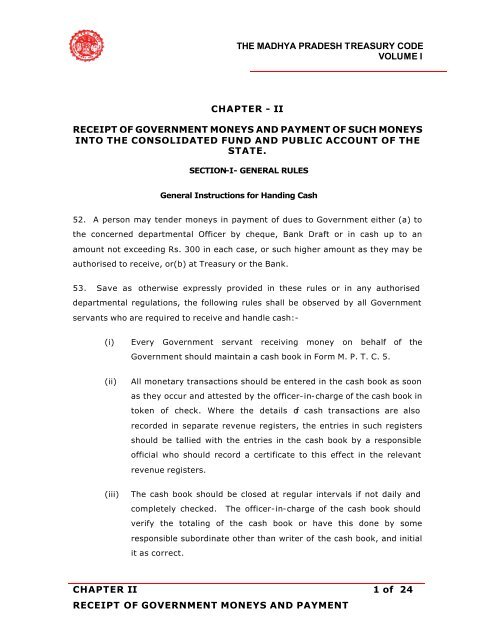
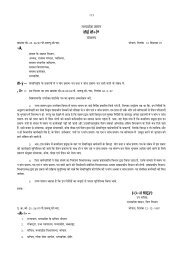
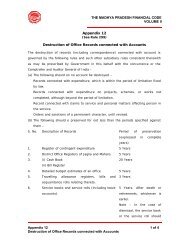
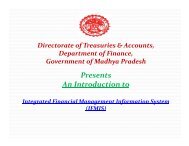
![Form M.P.F.C. 20 [See Rule 266 (4)] - Mptreasury.org](https://img.yumpu.com/50367893/1/190x146/form-mpfc-20-see-rule-266-4-mptreasuryorg.jpg?quality=85)
